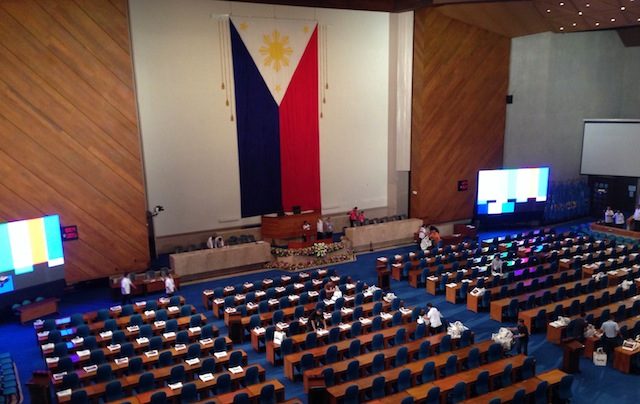SUMMARY
This is AI generated summarization, which may have errors. For context, always refer to the full article.

MANILA, Philippines – If countries such as China, Vietnam, and Indonesia were able to boost their economies without lifting constitutional bans on foreign ownerships of land, what is the urgency of amending the economic provisions of the Philippine Constitution?
With this argument, Akbayan Representative Walden Bello fired the first salvo as the House of Representatives opened plenary debates to amend the economic provisions of the Constitution on Tuesday, August 26,
The charter change proposal seeks to add the phrase “as may be provided by law” to at least 7 sections of the Constitution to allow Congress to pass enabling laws lifting bans on foreign ownership.
The charter change resolution, which Speaker Feliciano Belmonte Jr has pushed since the 15th Congress, seeks to add the phrase “as may be provided by law” to the following provisions of the Constitution:
- Section 2, Art. XII on exploration, development, and utilization of natural resources
- Section 3, Art. XII on alienable lands on the public domain
- Section 7, Art. XII on conveyance on private lands
- Section 10, Art. XII on reserved investments
- Section 11, Art. XII on grant of franchises, certificates, or any other forms of authorization for the operation of public entity
- Section 4 (2), Art. XIV on ownership of educational institutions
- Section 11 (1 and 2), Art. XVI on ownership and management of mass media and on the policy for engagement in the advertising industry
Bello and Davao City 2nd district Representative Mylene Garcia-Albano, chair of the House committee on constitutional amendments debated – and disagreed – over the intent of the resolution.
Bello, an economist before he became a congressman, questioned the need for charter change when other countries have managed to improve their economies without lifting bans on foreign ownership.
“We have seen that in two of the most dynamic economies – Vietnam and China – the fact that constitutional bans on foreign ownership is not a hindrance to development but that foreign investors have lived with it and moved forward,” Bello said.
In response, Albano sought to quash such concerns by arguing that the current charter change resolution only seeks to provide Congress with the leeway to make changes in the future, denying that it will automatically lift foreign ownership restrictions.
“The proposal just wants to give Congress the flexibility to respond to the times in the crafting of economic policies,” Albano said.
Albano used this argument to respond to each point that Bello raised.
Other priorities
For Bello, current political conditions are not yet conducive for charter change on economic provisions.
“Vietnam and China have very weak protections compared to the Philippines. May we not be barking at the wrong tree? May we not be looking at the wrong solution? It might be better to look at the real causes as to why foreign investment is weak in the Philippines and has been strong in other places such as Vietnam and China,” Bello said.
Before pushing for charter change to help encourage foreign investments, Bello said it would be more prudent for the government and Congress to pursue other programs or policies. He pointed out the need to complete the cadastral survey to delineate land boundaries of local government units – a vital component for agrarian reform – and the passage of the anti-trust law to promote fair competition.
While Albano reiterated that Congress still has to pass enabling laws to lift bans on foreign ownership should charter change be approved, Bello argued that the intention to lift such restrictions through the resolution has been clear from the start.
Bello cited an earlier privilege speech delivered by Cagayan de Oro Representative Rufus Rodriguez, a co-sponsor of the measure, where he said that commercial lands were of interest to foreign owners.
Historical baggage
Current charter change bids in the House mark the first attempt to revise the Constitution by legislation.
Previous attempts at charter change had failed due to its unpopularity, as well as disagreements over what mode to use in the process. Since its passage in 1987, the Constitution has yet to be revised.
Some lawmakers have also opposed charter change over concerns that it could pave the way for moves to extend the term of the President.
House leaders led by Belmonte have repeatedly given assurances that the proposal will only focus on economic amendments and will not touch any political provisions.
But a recent TV5 interview with Aquino, where he revealed that he has become open to charter change to clip the powers of the Supreme Court, and possibly, allow him to run for a second term, reintroduced a historical baggage that House leaders had earlier sought to eradicate.
Even then, Aquino has yet to endorse Belmonte’s economic charter change proposal.
House Majority Leader Neptali Gonzales II admitted that nothing stops any lawmaker from touching political provisions when the resolution reaches the period of amendments. But he also noted that there is still a certain number of votes still needed before such political amendments are approved.
The Senate, meanwhile, will first wait and see how debates will progress in the House before acting on the measure. – Rappler.com
Add a comment
How does this make you feel?
There are no comments yet. Add your comment to start the conversation.